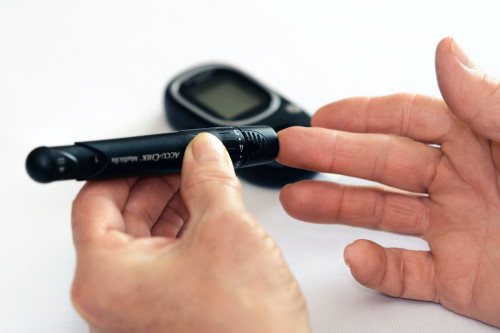- A new study, published Wednesday in The BMJ, found that adhering to a low carb diet for six months was associated with higher rates of remission among people with type 2 diabetes.
- However, the benefits flattened after about a year likely due to the restrictive diet.
- Lowering carb intake can help improve blood glucose levels along with other markers of carbohydrate intolerance or insulin resistance.
BREAKING: Diabetes Breakthrough Leaves Doctors Speechless - Try This Tonight
New research has found that a low carbohydrate diet may help some people with type 2 diabetes achieve remission.
The study, published Wednesday in The BMJ, found that strictly adhering to a low carb diet for six months was associated with higher rates of remission among people with type 2 diabetes.
Low carb eating can be difficult to stick with long term, and the benefits flattened off after a year.
While the findings highlight the significant benefits of following a low carb diet in the short term, more research is needed to better understand the long-term effects on weight loss, blood sugar levels, and quality of life.
Low carb diets linked to higher rates of remission
People with type 2 diabetes are intolerant to carbohydrates, and eating them in excess can increase their blood sugar levels and require them to take higher doses of insulin or diabetes medication.
To better understand the impact of a low carb diet, researchers analyzed data from 23 clinical trials that tracked 1,357 patients with type 2 diabetes.
The participants adhered to a low carb diet or very low carb diet for at least 12 weeks.
With low carb diets, 26 percent of daily calories came from carbohydrates, and with a very low carb diet, 10 percent of daily calories were from carbohydrates.
The patients’ health and well-being — blood sugar levels, weight loss, quality of life, and adverse health events — were evaluated at six months and 12 months.
Researchers found that patients who stuck with a low carb diet experienced greater rates of remission at six months compared with those who did not strictly adhere to a low carb diet.
Compared to other diets, low carb diets were associated with a 32 percent increase in diabetes remission.
Those who followed a low carb diet also experienced weight loss, healthier body fat concentrations, and reduced medication use.
Breaking down the benefits of a low carb diet
Dr. Minisha Sood, an endocrinologist at Lenox Hill Hospital, New York City, says she routinely recommends low carb diets to her patients with type 2 diabetes.
“I find that over time, in those who are non-adherent, the benefits may diminish over time. However, in those patients who can persevere and continue this nutritional approach, they usually continue to reap the benefits,” Sood said.
People with type 2 diabetes are intolerant to carbohydrates.
When “carbohydrate intake is lowered, the burden on their bodies to overproduce insulin to deal with those carbohydrates is also lowered,” Sood explained.
Lowering carb intake can help improve blood glucose levels along with other markers of carbohydrate intolerance or insulin resistance.
“A low or lower carb diet can cause less of a rise in blood sugar after eating,” says Audrey Koltun, a registered dietitian nutritionist and certified diabetes care and education specialist at Cohen Children’s Medical Center of New York.
What to know about switching to a low carb diet
There is no one diet that will work for everyone, and severe restrictions often lead to people giving up on a diet.
Sood said she advises her patients to start with one meal at a time.
For example, she suggests they tackle dinner first and aim to lower their carb intake by about 50 percent by swapping out unhealthy, starch-packed carbohydrates for healthier sources such as healthy grains or lentils.
From there, Sood advises her patients to gradually reduce their carb intake with breakfast, lunch, and snacks.
She recommends non-starchy vegetables and low glycemic index fruits like berries. Healthy grains — such as quinoa, sweet potatoes, and brown rice — and lentils are beneficial sources of carbohydrates, too, Sood added.
Sweets and processed foods, which Sood said are often carb-based, are swapped out for healthier options.
Koltun recommends healthy fats, such as nuts, avocado, guacamole, hummus, and olives. Unsweetened dairy products and protein-packed foods like eggs, cheese, poultry, and fish are also among the foods Koltun includes in low carb diet plans.
“After about two weeks, patients start to notice that they have more energy, they may have some weight loss, they may have more stable mood, and an overall better sense of well-being,” Sood said.
A food diary can help people who are new to a low carbohydrate diet stay on track.
Work with a doctor who can customize an eating plan
When beginning a low carbohydrate diet, it’s crucial to work with a doctor or registered dietitian who specializes in diabetes and nutrition.
“It’s important to monitor blood sugar levels and to have the assistance of a physician or other practitioner make medication adjustments as appropriate,” Sood said.
Koltun said people with type 2 diabetes shouldn’t begin a low carb diet without proper knowledge and guidance.
Not all carbohydrates impact blood sugar levels the same way.
Rather than opt for a restrictive diet, aim for a healthful and balanced low carb, high fiber diet, Koltun recommended.
“Nutrient deficiencies may occur from drastic changes and restricting an entire food group in one’s diet,” Koltun said. “Support and guidance and proper meal planning is needed.”
Also, nutrition therapy for diabetes requires a varied diet plan, Koltun added.
A specialist can personalize a diet that factors in people’s food preferences, lifestyles, cultural sensitives, and food insecurities.
TRENDING: This Keeps Your Blood Sugar Below 100 - Even When You're Eating Sweets!
The bottom line
New research suggests that a short-term low carbohydrate diet can help people with type 2 diabetes achieve remission. Lowering carbohydrate intake can also lead to increased weight loss, healthier body fat concentrations, and lower medication use. More research is needed on the long-term impact low carb diets can have on blood sugar levels, body fat, and quality of life.









